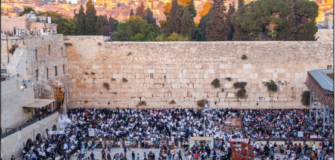Meet Beaumont Shapiro – The New Rabbi at the Skirball Cultural Center

By Casey J. Adler
Does a Jewish museum need a Rabbi? If its mission is to build a more just society, then the Skirball Cultural Center believes it does.
On June 5, 2023, the Skirball will welcome Beaumont Shapiro as its first-ever Rabbi in Residence. This momentous position will mark a new chapter in the Skirball’s long- held tradition of engaging the Jewish community and broader public; its tenant mission is to foster human connections and build a more just society. At a time of social unease, where building cultural bridges and community relationships is more important than ever, the Skirball Center believes there is not a better leader suited for the job than Rabbi Shapiro.
Shapiro, who holds a master’s degree in Hebrew letters from Hebrew Union College and degrees in religious studies and cinema-television from USC, will bring his wealth of experience and vision to the Skirball Center. He will provide guidance in Jewish history, ritual life, and philosophy; and will represent Skirball to the larger Jewish community. In speaking with Rabbi Shapiro, he sees his role as that of a Jewish Ambassador, where questions and intentionality, rather than dictates, will guide his leadership style:
“I don’t see my role as providing answers, or telling people what to do,” Rabbi Shapiro said over Zoom, “I see it far more as being a voice at the table to ask the question: how are Jewish values, Jewish ethics, Jewish traditions, and Jewish culture being represented in this particular program or this particular opportunity? To help shepherd these questions and conversations with our incredibly talented professionals in every department. Are we doing it in the way we want to, we mean to, so that we’re being deliberate about it, and it’s not happening accidentally.”

Jessie Kornberg, President and CEO of the Skirball Cultural Center, echoed Shapiro’s sentiments, “We imagined this position as essentially an internal consultant, somebody who could partner with each of us, as we imagine how to direct a museum Jewishly, how to build a hospitality program Jewishly…”
Asked what made Shapiro stand out in the crowd of eligible candidates, Kornberg replied, “We looked for all kinds of skills and experiences: the ability to be a teacher, a partner, a collaborator, a representative in the community, a deep thinker, and a person who takes action from the heart. And Rabbi Shapiro’s all of those things to be sure.”

A part of his mission as the new Rabbi in Residence will be to expand the relationships with the broader Jewish community, in order to provide a rich wellspring for cultural and secular Jews.
“Skirball is uniquely positioned to speak to and engage the overwhelming majority of Jews,” Shapiro said, “in Los Angeles, and in the world, who identify as cultural or secular Jews, who are largely not going to walk through the door of the synagogue, at least not anytime soon. And that doesn’t make those people any less Jewish. Which might sound odd for a Rabbi who spent his entire life in the synagogue world. And I think those people are still looking for ways to experience their Judaism and Jewish culture, Jewish identity, and Jewish traditions, and they don’t have a lot of places to turn.”
In addition to reaching out to the broader Jewish community, Shapiro will also foster intercultural bridges with Skirball. For the past two decades, Shapiro served as the Rabbi for Wilshire Boulevard Temple, where he led the beloved institution through remarkable growth and change. During his tenure, he created and oversaw the founding of the Karsh Family Social Service Center, a non-profit, non-religious organization serving Koreatown, one of the most diverse communities in all of America, and an economically-challenged neighborhood, with a wide scope of critical needs, including Parent & Child Wellbeing; pro bono Legal Services; Food & Nutrition Security; and Health & Wellness.
The Karsh Center is only one example of Shapiro’s myriad of organizational involvement. He currently sits on the Interreligious Council of Southern California, the Professional Development Committee of the Center Conference of American Rabbis, and the board of NECHAMA–Jewish Response to Disaster.
Building a more just society is the hallmark of many great spiritual leaders, which is a value at the heart of the Skirball Center. Kornberg declared, “Pursuing justice is one of six essential Jewish values that the Skirball has named as its institutional values: Welcome the Stranger; Show Kindness; Seek Learning; Build Community; Honor Memory; and Pursue Justice.”
Rabbi Shapiro counts the 20th-century civil rights icon Abraham Joshua Heschel and the 12th-century philosopher and scientist Maimonides as meaningful Jewish leaders, who continue to inspire him. In responding to what a ‘just society’ might like, Rabbi Shapiro extemporized:
Elie Wiesel famously said that the mission of the Jews has never been to make the world more Jewish, but to make the world more human. Certainly working toward a more just society, pursuing justice in the world—Judaism does not have a monopoly on that. Nor should it. We need everyone out there who cares and who is willing to engage in this work to do that. And it is, at the same time, a deeply rooted Jewish imperative to seek and pursue justice. And there are so many injustices in our world. It’s overwhelming. It’s frankly impossible, I think, to address all of it, to fix all of it as it were. And I think it’s very easy for that to lead to paralysis. The world is so broken and it needs so much fixing, that one person or one organization in Los Angeles, [might say], ‘what are we going to do? We can’t fix it all.’ And, interestingly Judaism’s answer to that has always been, ‘you’re right.’ [But] that doesn’t stop you from being obligated to do what you can. Just because the task seems great and overwhelming, that’s not an excuse to sit on the sidelines. Your obligation is to do what you can to work toward justice. A teacher of mine used to say that our job is to tend to the part of the garden we can reach. So the mission doesn’t say to achieve justice. It’s to work toward it. It’s a constant aspiration. And so what does that look like?

I often think of injustice in the world as a state of imbalance. It’s a state of imbalance that some of us are lucky enough, blessed enough, privileged enough to have kitchens and pantries filled with food and be able to wander in and cook whatever we want for dinner tonight or decide, ‘you know what, none of this looks good. I’m going to order DoorDash,’ or ‘No, I’m going to go out tonight.’ And then others in the world are going to bed hungry. In a world, by the way, in which hunger is no longer an issue of supply, it’s an issue of the allocation of resources, that’s an imbalance, in my opinion.
If you think about the scales of justice, how do we restore balance? I’m not suggesting that we need to remove or take away anything from those of us who have kitchens full of food. But what can we do to try to restore some of that balance in the world? What can we do to try to say it’s unjust that someone who needs to see a physician can’t, someone who wants their kids to get a good education can’t.
I think a lot of it is opening the conversation. And I think that Skirball is uniquely positioned to be a place where incredibly diverse, and different individuals and groups of people from all walks of life in all cultural backgrounds, religious backgrounds, ethnic backgrounds can engage in these conversations. I can’t think of another Jewish organization, Jewish institution that exists at the intersection of the Jewish world and the non-Jewish world, in such a robust way as Skirball. Where Jews and non-Jews at least have the potential to come together, if not, in the best sense of the word, collide. To experience one another, to learn about one another, and ultimately to work together to shape the society in the world we want to live in.
Kornberg added, “The line of scripture we quote here to help us understand how we want to pursue justice at the Skirball is that which says, ‘You shall not stand idly by while your neighbor bleeds.’ That’s what justice means here.”
Currently, on exhibition at the Skirball, visitors can explore the History of the Hollywood Blacklist, a period where Jewish creatives and executives were targeted. Now on view through September 3, 2023.
The Skirball is located at 2701 N. Sepulveda Blvd., Los Angeles, CA 90049. Museum hours: Tuesday–Friday, 12:00–5:00 pm; Saturday–Sunday, 10:00 am–5:00 pm; closed Mondays and holidays. Advance timed-entry reservations are recommended. For general information, the public may call (310) 440-4500 or visit skirball.org
























